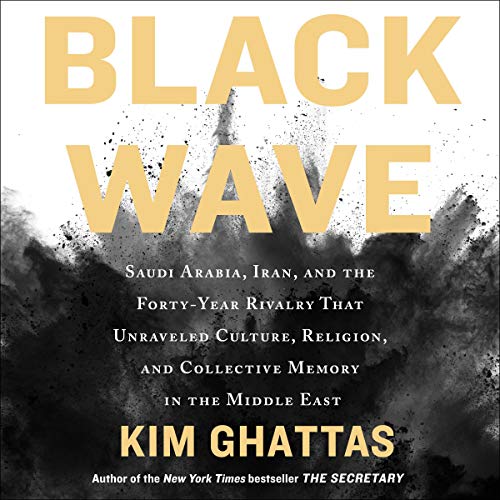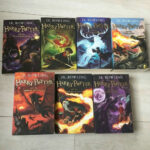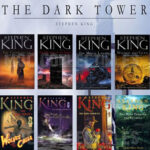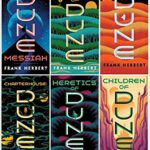Black Wave: Saudi Arabia, Iran, and the Forty-Year Rivalry That Unraveled Culture, Religion, and Collective Memory in the Middle East audiobook
Hi, are you looking for Black Wave: Saudi Arabia, Iran, and the Forty-Year Rivalry That Unraveled Culture, Religion, and Collective Memory in the Middle East audiobook? If yes, you are in the right place! ✅ scroll down to Audio player section bellow, you will find the audio of this book. Right below are top 5 reviews and comments from audiences for this book. Hope you love it!!!.

Review #1
Black Wave: Saudi Arabia, Iran, and the Forty-Year Rivalry That Unraveled Culture, Religion, and Collective Memory in the Middle East audiobook free
Not since “The Great War for Civilization” have I read such a sweeping overview of recent Middle Eastern history and in many ways, this book is better (as well as more accessible). While Robert Fisk, the author of that book, mostly blamed the West for everything that had happened to the Middle East, Kim Ghattas mostly blames Iran, Saudi Arabia and their rivalry (even if this theory is somewhat undermined by the two countries’ dtente during the 1990s and early 2000s). While that book was mostly a story about loss of life, this book is a story about loss of intellectual and social freedom.
Iran and Saudi Arabia, since 1979, have both been out to prove that their models of Islam are the only valid ones. The Saudi government didn’t understand that this would lead its citizens and proxies to turn on its own American protector, but far from cutting them loose, the Americans for their part have mostly blamed Iran (or minor players such as Saddam Hussein) and bucked up the pro-Saudi dictatorships holding power throughout most of the Sunni Muslim world. (I didn’t say Ghattas takes us off the hook entirely.) These dictatorships turned to Islam as a source of legitimacy and increasingly cracked down not only on Western imports but their own cultural legacy of a more cosmopolitan Islam. Iran was doing the same thing as Saudi Arabia (on a smaller scale due to having less disposable income). Dissenters in both Iran and Saudi Arabia remember being told as children that if they enjoyed music, molten iron would be poured into their ears on Judgment Day.
Ghattas’ book is also superior to Fisk’s in that the story of the devolution of Iran, Saudi Arabia and various other countries in the region is told not through her own eyes but through the eyes of a panoply of freethinkers both male and female with whom she has cultivated relationships. She tells the stories of their evolution and martyrdom or escape to the West.
Only one of the people who escaped to the West eventually returned to live in the region, which is why unlike Ghattas, I am inclined to despair for the Middle East. I don’t see how these countries can come back from the black hole into which the wave has swept them, especially given that people who want more freedom than currently on offer can simply move to the West. That pressure will prove irresistible to most, but perhaps there are exceptions. The young Saudi studying IT who lived in my boardinghouse might be one. I encouraged him to stay, but he went home to Saudi Arabia. If there is hope, it will be built upon by his generation. Five stars for the book.
Review #2
Black Wave: Saudi Arabia, Iran, and the Forty-Year Rivalry That Unraveled Culture, Religion, and Collective Memory in the Middle East audiobook streamming online
There are a handful of journalists at most of the old school today deeply digging, meticulous research, driving down the middle towards facts especially on the Middle East. Ghattas whose experience in the region and career around the globe, combined with this kind of journalism and superb writing, is a great rarity. Black Wave is a mind blow read, and the definitive start for any understanding of what is happening today, and a rich read to assess the context on the ground as things are seen there. A must read.
Review #3
Audiobook Black Wave: Saudi Arabia, Iran, and the Forty-Year Rivalry That Unraveled Culture, Religion, and Collective Memory in the Middle East by Kim Ghattas
The reader should be told that from these enthusiastic and often learned reviews one cannot distinguish between Kim Ghattas and an excellent encyclopedia article. Not since Barbara Tuchman’s Guns of August have I read a book which moved like a novel yet made so much clear. That’s the right book to compare Black Wave to. Ghattas’s book’s swiftness, its sense of the unstoppable, is not only an aesthetic pleasure. She gives the reader the sensation of the black wave inexorably sweeping forward, swallowing up first individuals, then entire countries. I don’t throw the word “great” around casually, but this is great historical writing.
Review #4
Audio Black Wave: Saudi Arabia, Iran, and the Forty-Year Rivalry That Unraveled Culture, Religion, and Collective Memory in the Middle East narrated by Kim Ghattas Nan McNamara
Kim Ghattas offers a study of the rivalry between Iran and Saudi Arabia since the revolutions of 1979.
For most Americans, we are familiar with the Iranian revolution of ’79 but know less about the changes
in Saudi Arabia and the Wahabi, which she describes as puritan, in order to provide an metaphor from
American history.
Ghattas begins with her own Lebanon. Despite being our focus as Americans since 2001, the Middle
East is confusing, so each chapter makes clear what country we are discussing and what year or years
the events took place. She then goes into Iraq, Libya, Pakistan, Afghanistan, Syria, Egypt, Palestine
and Israel and of course the United States. But the organizing principle for interpretation is the
rivalry between the Sunni and Shia represented by Iran (Persia) and the Saudis. When the Obama
administration made the nuclear deal with Iran, it was shifting American policy from favoring
the Sunni toward the Shia side. This may have been influenced by Zbig Brzezinski’s ideas about
the balance of power in books such as the Grand Chessboard (my guess, that has nothing to
do with the book). The Trump administration has moved back toward the alliance with the Saudi
and Sunni side of the dispute. Ghattas says that both Iran and Saudi Arabia feared ISIS, but they
hated each other more.
Ghattas provides helpful metaphors and analogies from American culture to deal with all these names.
For instance, the Wahabi is puritanical where the Ayatollah was radical and revolutionary, even though
the practices may look similar, because their relationship to previous history was different. She’ll say
that so and so is the “Audrey Hepburn” of the country she’s discussing. There are also musical references
like Joan Baez and Led Zeppelin to show the interaction of cultures. Her perspective is basically liberal
and feminist but not from a Western standard, we’re talking about issues like “driving a car” which became
a big thing with the Saudis. Although I didn’t see his name, there’s a lot of the radical scholar Edward Said
and the theory of Orientalism. But the specific project of the book is to answer Bernard Lewis’ question
of “What Went Wrong” in the last 41 years.
Among the major events are the Iran-Iraq war, the Gulf War of 1990-91, 9/11 and bin Laden/al Qaeda,
and the wars in Syria. There’s not a lot about Christians, although there were some mentions of their
difficulties. From her Lebanese perspective, Ghattas says that the colonials gave power to the Christians,
so the anti-Christian violence is partly anti-Western or anti-European. The concluding major event
was the assassination of Jamal Kashoggi and the new crown prince MBS, who has claimed to be
modernizing but is a disturbing authoritarian. There is a reference to the Saudis’ desire for Suleimani
to surrender, but he has since been killed by America. So while the book finished just a few months ago,
the story keeps changing.
Review #5
Free audio Black Wave: Saudi Arabia, Iran, and the Forty-Year Rivalry That Unraveled Culture, Religion, and Collective Memory in the Middle East – in the audio player below
I must start by saying how well written this book is. It tells a complex story spanning decades, countries and hundreds of personalities in an engaging and informative manner. It has a great pace and never flags, a considerable achievement.
Secondly, it links the events of the past 40 years in the Middle East and establishes the links (people and money) between them. Starting with the Iranian revolution in 1979 it establishes how events in different countries relate to one another and the overriding animus between Iran and Saudi Arabia.
I was in Iran in 1979 and aware of whatever has subsequently transpired in this region – in Iraq, Lebanon, Saudi, Syria, and Yemen. This book effectively connects the dots at both a geo-political level and by telling personal stories of hose involved.
You can read the book in a tragic fashion looking at the mistakes and miss steps by many leaders, organisations and governments. These are not simply mistakes but in many cases malevolent decisions the have destroyed the lives of millions, destroyed the rich Arab and Persian culture and left an instability in the region that will be with us for years to come.
I cant praise this book sufficiently.
Recommend Books
Galaxyaudiobook Member Benefit
- Free 2000+ ebooks (download and online)
- You can see your watched audiobooks
- You can have your favorite audiobooks
Galaxy audio player
If the audio player does not work, please report to us, we will fix it as soon as possible (scroll up a little you will find the "REPORT CONTENT" button).












0 Comments: